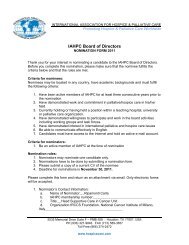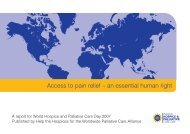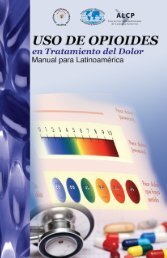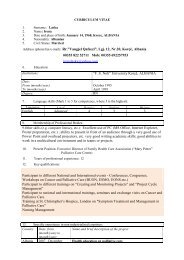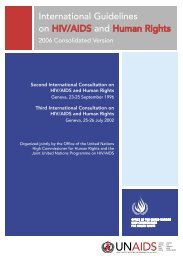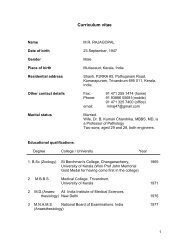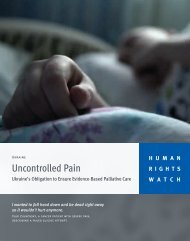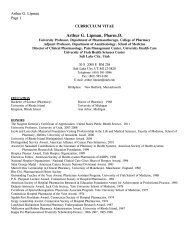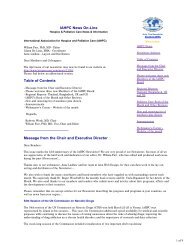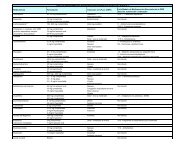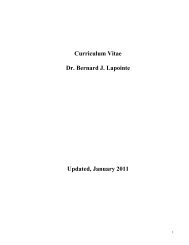INTERIGHTS Bulletin
INTERIGHTS Bulletin
INTERIGHTS Bulletin
Create successful ePaper yourself
Turn your PDF publications into a flip-book with our unique Google optimized e-Paper software.
<strong>INTERIGHTS</strong> <strong>Bulletin</strong><br />
Volume 16 Number 4 2011<br />
167<br />
such as removing stitches after a<br />
caesarean delivery. 11 Other countries<br />
where the problem is widespread<br />
include Nigeria. The fear of being<br />
detained discourages women from<br />
seeking skilled maternal care. Even<br />
those that do have the courage to seek<br />
professional treatment during delivery<br />
may risk forgoing post-natal care in<br />
order to escape detention. 12<br />
The detention of poor patients by<br />
hospitals is prevalent in numerous<br />
African countries where the health<br />
system is based on cost recovery. The<br />
practice is found in countries<br />
including Kenya, Ghana and the<br />
Democratic Republic of Congo, and<br />
there was at least one instance in<br />
Zimbabwe concerning multiple<br />
patients. 13<br />
The detention of persons who are not<br />
able to pay their bills raises a number<br />
of concerns under international<br />
human rights law. This includes the<br />
right not to be arbitrarily detained, 14<br />
detained as a debtor 15 or mistreated in<br />
detention, 16 as protected under the<br />
International Covenant on Civil and<br />
Political Rights (ICCPR). The impact<br />
of the policy on individuals seeking<br />
health care also implicates the state’s<br />
duty to progressively realise the right<br />
to the highest attainable standard of<br />
health under the International<br />
Covenant on Economic, Social and<br />
Cultural Rights (ICESCR). 17<br />
Denial of emergency care<br />
In South Africa both documented and<br />
undocumented migrants have been<br />
denied access to health care. Even<br />
when seeking emergency care after<br />
xenophobic attacks or rapes, migrants<br />
are often turned away by medical<br />
personnel who may discharge them<br />
prematurely, harass them, charge<br />
them excessive user fees and/or call<br />
the police to deport them. 18<br />
Language barriers and lack of<br />
information make meaningful<br />
counselling and consent all but<br />
impossible. Rape survivors, who<br />
frequently lack knowledge of the<br />
services available to them and often<br />
fear deportation, face barriers in<br />
accessing lifesaving post-rape care,<br />
including emergency contraception<br />
and post-exposure prophylaxis (PEP)<br />
within the 72-hour window for<br />
treatment after an assault. Some<br />
healthcare facilities erroneously<br />
require survivors to report the rape to<br />
the police before assistance is given.<br />
For undocumented asylum seekers<br />
and other migrants who fear<br />
deportation, such a requirement is<br />
frequently prohibitive. 19<br />
The United Nations Special<br />
Rapporteur on the Right of Everyone to<br />
the Enjoyment of the Highest<br />
Attainable Standard of Physical and<br />
Mental Health has stated that asylum<br />
seekers and even illegal immigrants<br />
should enjoy the right to health:<br />
States are under the obligation to<br />
respect the right to health by, inter alia,<br />
refraining from denying or limiting<br />
equal access for all persons, including<br />
prisoners or detainees, minorities,<br />
asylum seekers and illegal immigrants,<br />
to preventive, curative and palliative<br />
health services. 20<br />
South Africa has signed, but not<br />
ratified, the ICESCR, meaning that it<br />
undertakes not to undermine the<br />
object and purpose of the treaty. 21<br />
Under South Africa’s Constitution,<br />
everyone has the right to have<br />
healthcare services and no one may be<br />
refused emergency medical<br />
treatment. 22 Furthermore, the South<br />
African Constitutional Court has<br />
explicitly considered the ICESCR in<br />
interpreting the scope of social and<br />
economic rights guaranteed by the<br />
Constitution. 23 The ICESCR<br />
guarantees the right of everyone to the<br />
highest attainable standard of<br />
health. 24<br />
In Nigeria, there have been repeated<br />
calls for repeal of a defunct police<br />
directive which mandates that victims<br />
of gunshot wounds, violent crimes and<br />
accidents must produce a police report<br />
before emergency medical treatment<br />
can be administered. Every year many<br />
gunshot victims are denied such care<br />
and left to die. Every three months at<br />
least twenty victims reportedly die in<br />
this way, with many more going<br />
unreported. Medical staff who have<br />
helped victims without first obtaining<br />
these reports have faced arrest and<br />
harassment from Nigerian law<br />
enforcement agencies. 25<br />
In September 2009, the death of<br />
Guardian journalist Bayo Ohu as a<br />
result of this ‘No Police Report, No<br />
Treatment’ policy publicised the issue<br />
and prompted calls for the law to be<br />
decisively changed. The public outcry<br />
caused the police to officially rescind<br />
their directive in October 2009, but<br />
the outdated law – Section 4(2) of the<br />
Robbery and Firearms (Special<br />
Provisions) Decree No. 21 of 1984 –<br />
officially remains in place. 26<br />
According to international law, states<br />
are required to have in place adequate<br />
medical services 27 including<br />
‘system(s) of urgent medical care in<br />
cases of accidents’ with services being<br />
‘available, accessible and of good<br />
quality.’ 28 Medical staff in hospitals<br />
are also under a corresponding duty to<br />
provide the necessary treatment. 29<br />
These provisions shall be<br />
accomplished within ‘available<br />
resources,’ regardless of the level of<br />
economic constraints that the country<br />
might experience. 30 As part of its core<br />
minimum obligation, the victim has a<br />
right of access to health facilities on a<br />
non-discriminatory basis. 31<br />
With a view to the routine practice of<br />
denying emergency treatment, in this<br />
case to Roma people in Hungary, the<br />
UN Committee on Economic Social<br />
and Cultural Rights urged the state<br />
party to ensure ‘adequate access to<br />
health care, including [ for]<br />
disadvantaged and marginalized<br />
individuals and groups.’ 32<br />
The Human Rights Committee, in the<br />
context of prisoners, has repeatedly<br />
found that the denial of medical<br />
attention amounts to cruel, inhuman<br />
or degrading treatment. 33 In Leehong v<br />
Jamaica, the Committee found<br />
violations of Article 7 and 10(1) of the<br />
ICCPR since the applicant had ‘only<br />
been allowed to see the doctors once<br />
despite having sustained beating by



